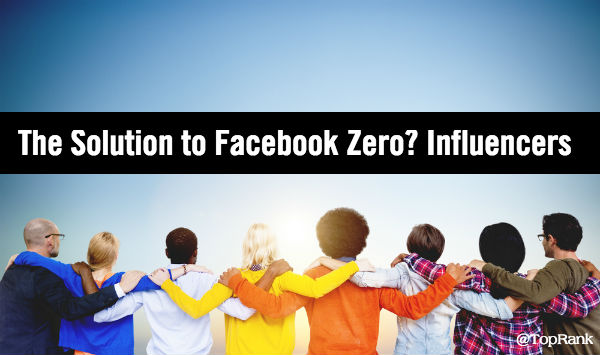
Earlier this month, marketers were shocked to learn that Facebook would be making more major changes to its News Feed, effectively bringing brand and publisher organic reach to zero by prioritizing high engagement content from family, friends and groups.
In a formal statement posted on his own Facebook page, Mark Zuckerberg said:
“We built Facebook to help people stay connected and bring us closer together with the people that matter to us. That’s why we’ve always put friends and family at the core of the experience. Research shows that strengthening our relationships improves our well-being and happiness.”
“But recently we’ve gotten feedback from our community that public content — posts from businesses, brands and media — is crowding out the personal moments that lead us to connect more with each other. … Based on this, we’re making a major change to how we build Facebook.”
While the announcement seemed to be the final nail in the organic News Feed coffin, the death of organic reach on Facebook has been a long time coming. Back in April 2015, Facebook announced it was updating News Feeds to strike a better balance between friends, public figures, publishers, businesses and community organizations. Then in late June 2016, Facebook said it would be making further refinements to ensure users don’t miss updates from their friends and families.
Now, after an intense year of political and social upheaval — not to mention the emergence of the fake news engine and the Russian advertising scandal — it’s no surprise that Facebook is re-examining things yet again.
But What Does It All Mean for Marketers?
Naturally, disappointed marketers all over the world are wondering how this change will truly impact their social marketing efforts. From our perspective, the change:
- Ends the organic reach of the News Feed and increases the importance of adding pay-to-play to your marketing mix — something that will likely require a bigger budget.
- Bolsters the importance of channel diversification.
- Makes it more important than ever for you to zero in on who your audience is and what motivates them, so you can share content and create an environment that will pique interest and engagement.
- Means Instagram will more than likely follow suit in the near future.
The Influencer Implication
Since Zuckerberg’s announcement, there’s been one implication in particular that’s captivated our attention. The way we see it, the value of influencer engagement on Facebook will increase even more.
Our CEO, Lee Odden, has long been an evangelist for working with influencers, believing that influencers can help brands bypass several obstacles. AdBlocking, for example, is in use on over 600 million devices, costing business over $22 billion in ad revenue, according to PageFair. Working with credible influencers who are trusted amongst an audience allows brands to bypass the adblocking obstacle and better connect with buyers.
Lee has also talked about other challenges such as distrust of brand advertising. In fact, 69% of consumers don’t trust ads, according to research by Ipsos Connect. And yet another obstacle is information overload. Americans are confronted with an average of 63GB of media on a daily basis (USC/ICTM).
All of these obstacles, according to Lee, are addressed by working with industry influencers. The virtual elimination of organic News Feed visibility for brands and publishers on Facebook is no different and marketers would be smart to think about how influencer engagement can keep organic Facebook visibility alive.
So, to sum it all up: Now that the organic News Feed is effectively dead, new life is being given to influencer marketing opportunities. Here are a few key considerations:
#1 – If you’re not in the influencer marketing game yet, you can no longer afford to wait.
Last year, we saw influencer marketing explode — becoming one of the most talked about topics among marketers and arguably our most-requested digital marketing services among both B2B and B2C clients. In addition, our own research shows that 57% of marketers say influencer marketing will be integrated in all marketing activities in the next three years.
This quote from Lee sums it up well:
“For any kind of content a business creates and publishes to the world, there is an opportunity for collaboration with credible voices that have active networks interested in what those voices have to say. In many cases, [audiences are] far more interested [in an influencer’s insights] than in what the brand has to say.”
With Facebook reducing branded content and elevating content from individuals, there’s no better time to invest in influencers — which can have an impact across all social platforms.
With #Facebook reducing branded content and elevating content from individuals, there’s no better time to invest in influencers. #influencermarketing Share on X#2 – Influencers now hold more power than ever to more strategically align themselves with brands of their choice.
Influencer marketing was already poised to be big in 2018, but this change to Facebook’s platform will absolutely spur more brands and businesses to dip their toe into the water. As a result, influencers will see an uptick in requests, giving them more power to be very choosy about which brands they lend their time, insights and audience to.
Influencers have more power to be very choosy about the brand they lend their time, insights and audience to. #influencermarketing Share on X#3 – Influencer nurturing will be more important than ever.
As illustrated by the previous two points, the Facebook change will lead to an increased adoption of influencer marketing, giving influencers more options. So it’s no surprise that it’ll be time to double-down on your commitment to influencer nurturing.
Now, we’ve always said that when it comes to building relationships and rapport with influencers, it’s critical that you put the time and effort into nurturing — rather than simply reaching out when you have a need. There has to be shared value.
But I think most marketers would admit that they have significant room for improvement in this area — and there’s no time like the present to recommit yourself.
With #Facebook’s recent algorithm change, it’s time to double-down on your commitment to nurturing your influencers. #influencermarketing Share on XCapitalize on the Opportunity
Let’s face it. This “major change” to Facebook’s platform isn’t the first and it certainly won’t be the last. As a result, now is the time to fully capitalize on the opportunity by better working with industry influencers. Now is the time to refocus on connecting with your audience — and influencers can help you do just that by adding authenticity, credibility, unique insights and new eyeballs to your content.
What else is in store for influencer marketing in 2018? Check out these rising influencer marketing trends that you need to pay attention to.
What do you think about the latest Facebook News Feed algorithm change? Tell us in the comments section below.


